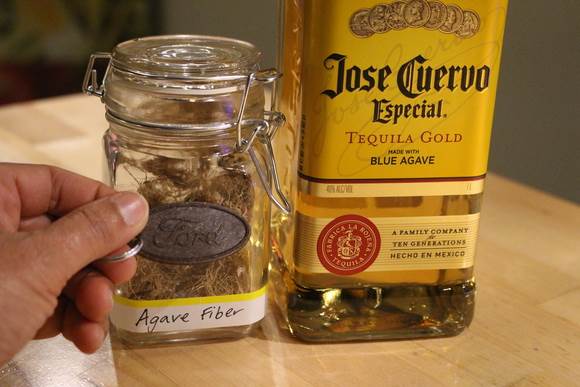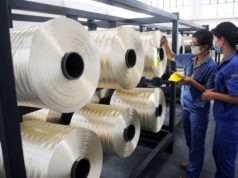One word: Plastics.

Ford is experimenting with agave fiber left over from tequila production to make more sustainable plastics for its cars.
Credit:
Melissa Riofrio
Tequila, weed, cash, and a Ford car could be the elements for a hell of a road trip, but they’re also part of the automaker’s efforts to be more sustainable. At a Ford-sponsored panel discussion August 16 in San Francisco, senior technical leader Debbie Mielewski showed how the company was working with famed tequila maker José Cuervo to use less plastic in its car parts.
José Cuervo had tons of strong, durable agave fiber left over from tequila production. The company was using some of it for compost, as well as paper and local crafts, but much of it was going to waste. Because its operations happened to be near Ford’s automotive plants in Mexico, Mielewski and her team had a perfect opportunity to try the fiber as a reinforcing material for plastic.
Ford can’t remove all 400 pounds of petroleum-based plastic in a typical car, Mielewski said, but incorporating agave fiber or another reinforcing material helps reduce it—and finds a new purpose for a material that would otherwise be discarded.
 Ford Motor Company
Ford Motor CompanyThe dried agave fiber from José Cuervo tequila production could help reinforce a more sustainable bioplastic.
At the event, Ford handed out keychains made from the agave-based experimental bioplastic. It’s a lightweight, brown-colored material, with shreds of agave fiber clearly showing. Someday, Ford hopes to use it for making internal parts like storage bins or wiring harnesses.
 Ford Motor Company
Ford Motor CompanyThe experimental bioplastic with agave fiber could be molded into storage bins and other interior car parts.
Ford’s actually been working on sustainable materials for 15 years, Mielewski explained. The research gained urgency when oil prices shot up, making petroleum-based materials more expensive to produce. Mielewski and her team were already conducting experiments on soy-based foam, based on soybean oil that local Michigan farmers couldn’t sell. Now soy foam is in the upholstery of all Ford cars.
 Melissa Riofrio
Melissa RiofrioShredded money is one of the many hard-to-repurpose waste materials that Ford’s hoping to turn into sustainable plastic.
The cash is retired U.S. currency, which is made of a high-quality, cotton-based paper. Finely shredded, it’s another material Ford’s testing with plastic.
Weed could be next. Mielewski said her team looked into using hemp fiber some years ago, but at the time, no one could grow it legally in the United States. Well, except one group, Mielewski qualified: “We had talked to Indian reservations that said they could grow it for us, because they’re sovereign nations.” Those talks fell through.
Now that some states are allowing marijuana production, Mielewski has high hopes. In the meantime, her team will be busy with the agave fiber and shredded cash, along with rice hulls, coconut fiber, sugarcane, and more.







